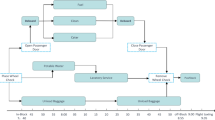Abstract
Flight schedule fluctuations are very common in many airports, which means the arrival of flights tend to be different from the plan. It has caused huge challenges for airports to real-time schedule the specialized vehicles to finish the ground-service operations. However, the existing scheduling methods, such as optimization algorithms and off-line simulations, rarely utilize the real-time information and could not adjust the specialized vehicles dispatching according to the flight schedule fluctuations. As a result, precise operation control for specialized vehicles couldn’t be achieved. Therefore, this paper proposes a real-time scheduling strategy for specialized vehicles based on digital-twin, which is constructed by cloud-and-edge computing architecture. This method uses real-time arrival of flights and the current status of vehicles to generate and adjust the schedules of specialized vehicles. In this method, specialized vehicle priority and flight one are taken into account, and both of them are calculated based on the real-time information in the digital twin model. A number of experiments were processed and experimental results show that the proposed method have a better performance in shortening ground-service duration of three kinds of flights and improving the number of flights departed on time.
Supported by Sichuan Science and Technology Program (No. 2021003).
Access this chapter
Tax calculation will be finalised at checkout
Purchases are for personal use only
Similar content being viewed by others
References
Ulm, G., Smith, S., Nilsson, A., et al.: OODIDA: on-board/off-board distributed real-time data analytics for connected vehicles. Data Sci. Eng. 6(1), 102–117 (2021)
AlMashari, R., AlJurbua, G., AlHoshan, L., et al.: IoT-based smart airport solution. In: 2018 International Conference on Smart Communications and Networking (SmartNets), p. 1. IEEE (2018)
Li, B., Liang, R., Zhou, W., et al.: LBS meets blockchain: an efficient method with security preserving trust in SAGIN. IEEE Internet Things J. 9(8), 5932–5942 (2021)
Li, B., Liang, R., Zhu, D., et al.: Blockchain-based trust management model for location privacy preserving in VANET. IEEE Trans. Intell. Transp. Syst. 22(6), 3765–3775 (2020)
Salis, A., Jensen, J.: A smart fog-to-cloud system in airport: challenges and lessons learnt. In: 21st IEEE International Conference on Mobile Data Management (MDM), pp. 359–364. IEEE (2020)
Koroniotis, N., Moustafa, N., Schiliro, F., et al.: A holistic review of cybersecurity and reliability perspectives in smart airports. IEEE Access 8, 209802–209834 (2020)
Zhang, M., Tao, F., Nee, A.Y.C.: Digital twin enhanced dynamic job-shop scheduling. J. Manuf. Syst. 58, 146–156 (2021)
Saifutdinov, F., Jackson, I., Tolujevs, J., et al.: Digital twin as a decision support tool for airport traffic control. In: 61st International Scientific Conference on Information Technology and Management Science of Riga Technical University (ITMS), pp. 1–5. IEEE (2020)
Guo, H., Chen, M., Mohamed, K., et al.: A digital twin-based flexible cellular manufacturing for optimization of air conditioner line. J. Manuf. Syst. 58, 65–78 (2021)
Cheung, A., Ip, W.H., Lu, D., et al.: An aircraft service scheduling model using genetic algorithms. J. Manuf. Technol. Manag. 16, 109–119 (2005)
He, D.: Research on ground service vehicle scheduling problem of large airport flights. Master’s thesis, Beijing Jiaotong University, Beijing (2018)
Kuhn, K., Loth, S.: Airport service vehicle scheduling (2009)
Yin, L., Heng, H.: Research on the application of airport special vehicle scheduling based on nearest neighbor algorithm. Comput. Technol. Devt. 26(7), 151–155 (2016)
Huang, L.: Simulation study on apron vehicle scheduling based on SIMIO. Master’s thesis, Nanjing University of Aeronautics and Astronautics, Nanjing (2013)
Tao, J.: Simulation and optimization of apron support service equipment scheduling. Master’s Thesis, Nanjing University of Aeronautics and Astronautics, Nanjing (2011)
Chen, H., Zhu, X., Liu, G., et al.: Uncertainty-aware online scheduling for real-time workflows in cloud service environment. IEEE Trans. Serv. Comput. 14(4), 1167–1178 (2018)
Jia, P., Wang, X., Shen, X.: Digital-twin-enabled intelligent distributed clock synchronization in industrial IoT systems. IEEE Internet Things J. 8(6), 4548–4559 (2020)
Wang, X., Han, S., Yang, L., et al.: Parallel internet of vehicles: ACP-based system architecture and behavioral modeling. IEEE Internet Things J. 7(5), 3735–3746 (2020)
Min, Q., Lu, Y., Liu, Z., et al.: Machine learning based digital twin framework for production optimization in petrochemical industry. Int. J. Inf. Manag. 49, 502–519 (2019)
de Carvalho, F.A.T., Neto, E.A.L., da Silva, K.C.F.: A clusterwise nonlinear regression algorithm for interval-valued data. Inf. Sci. 555, 357–385 (2021)
Author information
Authors and Affiliations
Corresponding author
Editor information
Editors and Affiliations
Rights and permissions
Copyright information
© 2023 The Author(s), under exclusive license to Springer Nature Switzerland AG
About this paper
Cite this paper
Zhang, H., Liu, M., Liu, C., Luo, Q., Chen, Z. (2023). Scheduling Strategy for Specialized Vehicles Based on Digital Twin in Airport. In: Li, B., Yue, L., Tao, C., Han, X., Calvanese, D., Amagasa, T. (eds) Web and Big Data. APWeb-WAIM 2022. Lecture Notes in Computer Science, vol 13423. Springer, Cham. https://doi.org/10.1007/978-3-031-25201-3_4
Download citation
DOI: https://doi.org/10.1007/978-3-031-25201-3_4
Published:
Publisher Name: Springer, Cham
Print ISBN: 978-3-031-25200-6
Online ISBN: 978-3-031-25201-3
eBook Packages: Computer ScienceComputer Science (R0)




